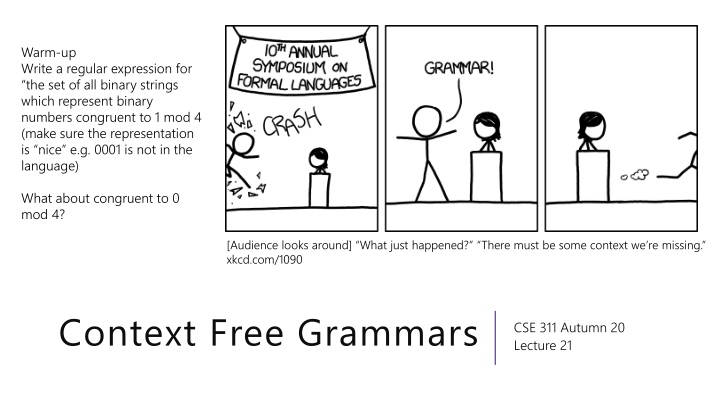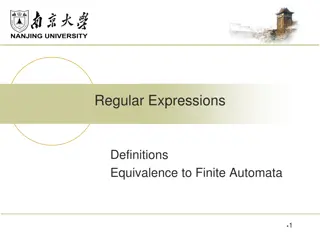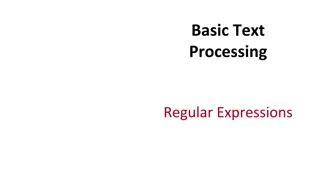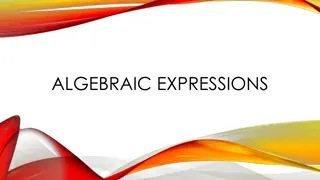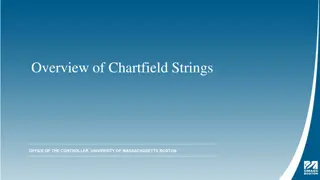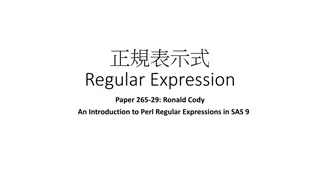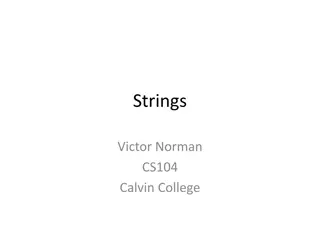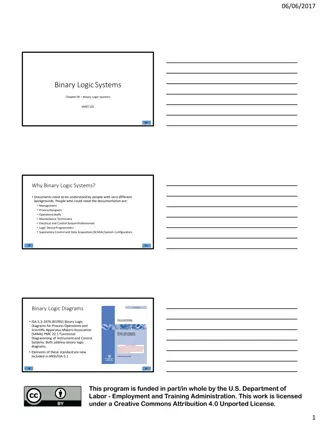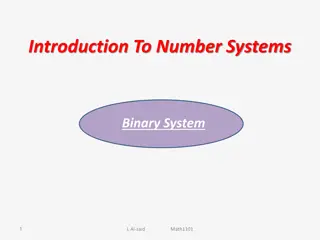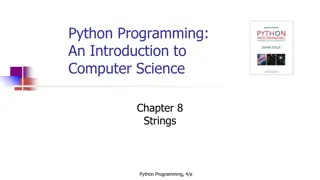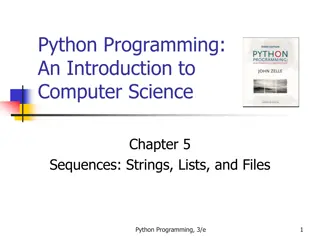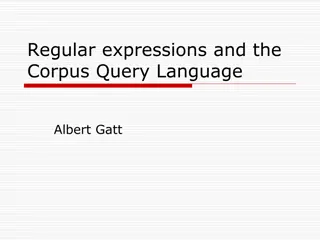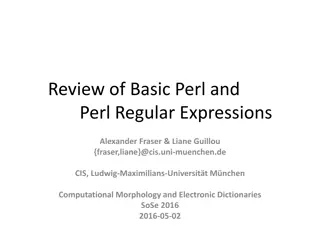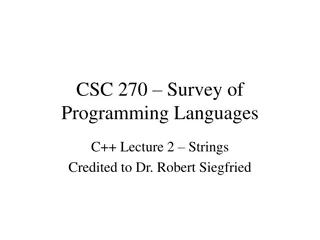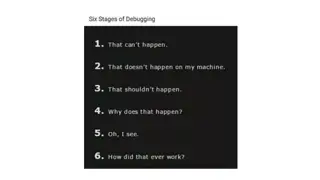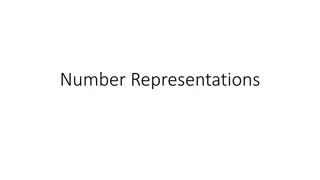Regular Expressions: Binary Strings Representation
Regular expressions play a vital role in defining patterns within strings. This content delves into creating regular expressions for binary strings that represent numbers congruent to 1 or 0 mod 4, along with additional practice exercises. Practical advice and examples are provided for better understanding and application of regular expressions in various contexts.
Download Presentation

Please find below an Image/Link to download the presentation.
The content on the website is provided AS IS for your information and personal use only. It may not be sold, licensed, or shared on other websites without obtaining consent from the author.If you encounter any issues during the download, it is possible that the publisher has removed the file from their server.
You are allowed to download the files provided on this website for personal or commercial use, subject to the condition that they are used lawfully. All files are the property of their respective owners.
The content on the website is provided AS IS for your information and personal use only. It may not be sold, licensed, or shared on other websites without obtaining consent from the author.
E N D
Presentation Transcript
Warm-up Write a regular expression for the set of all binary strings which represent binary numbers congruent to 1 mod 4 (make sure the representation is nice e.g. 0001 is not in the language) What about congruent to 0 mod 4? [Audience looks around] What just happened? There must be some context we re missing. xkcd.com/1090 Context Free Grammars CSE 311 Autumn 20 Lecture 21
More Practice You can also go the other way Write a regular expression for the set of all binary strings of odd length Write a regular expression for the set of all binary strings with at most two ones Write a regular expression for strings that don t contain 00
More Practice You can also go the other way Write a regular expression for the set of all binary strings of odd length 0 1 00 01 10 11 Write a regular expression for the set of all binary strings with at most two ones 0 1 ? 0 1 ? 0 Write a regular expression for strings that don t contain 00 01 1 (0 ?) (key idea: all 0s followed by 1 or end of the string)
Practical Advice Check ? and 1character strings to make sure they re excluded or included (easy to miss those edge cases). If you can break into pieces, that usually helps. nots are hard (there s no not in standard regular expressions But you can negate things, usually by negating at a low-level. E.g. to have binary strings without 00, your building blocks are 1 s and 0 s followed by a 1 01 1 (0 ?) then make adjustments for edge cases (like ending in 0) Remember allows for 0copies! To say at least one copy use ?? .
Regular Expressions In Practice EXTREMELY useful. Used to define valid tokens (like legal variable names or all known keywords when writing compilers/languages) Used in grep to actually search through documents. Pattern p = Pattern.compile("a*b"); Matcher m = p.matcher("aaaaab"); boolean b = m.matches(); ^ start of string $ end of string [01] a 0 or a 1 [0-9] any single digit \. period \, comma \- minus . any single character ab a followed by b (AB) (A B) (a|b) a or b a? zero or one of a (A ) a* zero or more of a A* a+ one or more of a AA* e.g. ^[\-+]?[0-9]*(\.|\,)?[0-9]+$ General form of decimal number e.g. 9.12 or -9,8 (Europe)
Regular Expressions In Practice When you only have ASCII characters (say in a programming language) | usually takes the place of ? (and perhaps creative rewriting) take the place of ?. E.g. 0 ? 1 10 is 0?(1|10)*
A Final Vocabulary Note Not everything can be represented as a regular expression. E.g. the set of all palindromes is not the language of any regular expression. Some programming languages define features in their regexes that can t be represented by our definition of regular expressions. Things like match this pattern, then have exactly that substring So before you say ah, you can t do that with regular expressions, I learned it in 311! you should make sure you know whether your language is calling a more powerful object regular expressions . But the more fancy features beyond regular expressions you use, the slower the checking algorithms run, (and the harder it is to force the expressions to fit into the framework) so this is still very useful theory. substring appear later.
What Cant Regular Expressions Do? Some easy things Where you could say whether a string matches with just a loop {0?1?:? 0} The set of all palindromes. And some harder things Expressions with matched parentheses Properly formed arithmetic expressions Context Free Grammars can solve all of these problems!
Context Free Grammars A context free grammar (CFG) is a finite set of production rules over: An alphabet of terminal symbols A finite set ?of nonterminal symbols A start symbol (one of the elements of ?) usually denoted ?. A production rule for a nonterminal ? ? takes the form ? ?1?2 |?? Where each ?? ? is a string of nonterminals and terminals.
Context Free Grammars We think of context free grammars as generating 1. Start from the start symbol ?. 2. Choose a nonterminal in the string, and a production rule ? ?1?2 |?? replace that copy of the nonterminal with ??. 3. If no nonterminals remain, you re done! Otherwise, goto step 2. generating strings. A string is in the language of the CFG iff it can be generated starting from ?. Notation: ??? ??? is rewriting ? with ?.
Examples ? 0?0 1?1 0|1|? ? 0?|?1|? ? ? ?? ? ? ?? ? 0?1|? ? 1?0|?
Examples ? 0?0 1?1 0|1|? The set of all binary palindromes ? 0?|?1|? The set of all strings with any 0 s coming before any 1 s (i.e. 0 1 ) ? ? ?? ? Balanced parentheses ? ?? ? 0?1|? ? 1?0|?{0?1?+?0?:?,? 0}
Arithmetic ? ? + ? ? ? ? ? ? ? 0 1 2 3 4 5 6 7 8|9 Generate 2 ? + ? Generate 2 + 3 4 in two different ways
Arithmetic ? ? + ? ? ? ? ? ? ? 0 1 2 3 4 5 6 7 8|9 Generate 2 ? + ? ? ? + ? ? + ? ? ? + ? 2 ? + ? 2 ? + ? (2 ? + ?) Generate 2 + 3 4in two different ways ? ? + ? ? + ? ? 2 + ? ? 2 + 3 ? 2 + 3 4 ? ? ? ? + ? ? 2 + ? ? 2 + 3 ? 2 + 3 4
Parse Trees Suppose a context free grammar ? generates a string ? A parse tree of ? for ? has Rooted at ? (start symbol) Children of every ? node are labeled with the characters of ? for some ? ? Reading the leaves from left to right gives ?. S 0 S 0 ? 0?0 1?1 0 1 ? 1 S 1 1
Back to the arithmetic ? ? + ? ? ? ? ? ? ? 0 1 2 3 4 5 6 7 8|9 Two parse trees for 2 + 3 4 E E E E E E E E E E E E + E E + 4 E E E E 2 E E 3 3 2 4
How do we encode order of operations If we want to keep in order we want there to be only one possible parse tree. Differentiate between things to add and things to multiply Only introduce a * sign after you ve eliminated the possibility of introducing another + sign in that area. E E E E T T + T T F F T T ? ?|? + ? F F N N F F ? ?|? ? N N ? ? |? 4 N N ? ? ? ? 0 1 2 3 4 5 6 7|8|9 3 2
CNFs in practice Used to define programming languages. Often written in Backus-Naur Form just different notation Variables Variables are <names-in-brackets> like <if-then-else-statement>, <condition>, <identifier> is replaced with = or
Parse Trees Remember diagramming sentences in middle school? <sentence>::=<noun phrase><verb phrase> <noun phrase>::=<determiner><adjective><noun> <verb phrase>::=<verb><adverb>|<verb><object> <object>::=<noun phrase>
Parse Trees <sentence>::=<noun phrase><verb phrase> <noun phrase>::=<determiner><adjective><noun> <verb phrase>::=<verb><adverb>|<verb><object> <object>::=<noun phrase> The old man the boat.
The old man the boat By Jochen Burghardt - Own work, CC BY-SA 4.0, https://commons.wikimedia.org/w/index.php?curid=92742400
Power of Context Free Languages There are languages CFGs can express that regular expressions can t e.g. palindromes What about vice versa is there a language that a regular expression can represent that a CFG can t? No! Are there languages even CFGs cannot represent? Yes! {0?1?2?3?|?,? 0} cannot be written with a context free grammar.
Takeaways CFGs and regular expressions gave us ways of succinctly representing sets of strings Regular expressions super useful for representing things you need to search for CFGs represent complicated languages like java code with valid syntax After Thanksgiving, we ll talk about how each of these are equivalent to weaker computers. Next time: Two more tools for our toolbox.
